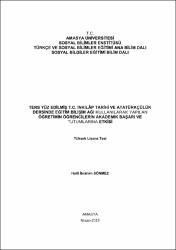Ters yüz edilmiş T.C. İnkılâp Tarihi ve Atatürkçülük dersinde Eğitim Bilişim Ağı kullanılarak yapılan öğretimin öğrencilerin akademik başarı ve tutumlarına etkisi
Özet
Bu araştırmanın amacı, ters yüz edilmiş sekizinci sınıf T.C. İnkılâp Tarihi ve Atatürkçülük dersinde Eğitim Bilişim Ağı (EBA) kullanılarak yapılan öğretimin müfredata dayalı geleneksel öğretime göre öğrencilerin akademik başarılarına, çoklu ortam tutumlarına ve derse yönelik tutumlarına etkisini tespit etmektir. Araştırma ön test-son test kontrol gruplu yarı deneysel desene göre tasarlanmıştır. Araştırmanın çalışma grubunu 2017-2018 eğitim-öğretim yılı ikinci döneminde Amasya il merkezinde yer alan iki farklı ortaokulun 8. sınıflarında öğrenim görmekte olan iki şubeden toplam 38 öğrenci oluşturmaktadır. Çalışma grubundaki öğrencilerin cinsiyet, sınıf mevcudu, 7. sınıftaki sınıf geçme notu ve sosyal bilgiler dersi not ortalaması açısından denk olmalarına dikkat edilmiştir. Araştırmada, okullardaki mevcut sınıflar kullanıldığından, öğrencilerin yansız atama yoluyla eşleştirilmeleri için özel bir çaba harcanmamış ve eşleştirilmemiş kontrol gruplu model kullanılmış, gruplar yansız küme örnekleme yoluyla belirlenmiştir. Araştırmada veri toplama aracı olarak, Akademik Başarı Testi, Çoklu Ortam Tutum Ölçeği ve T.C. İnkılâp Tarihi ve Atatürkçülük Dersi Tutum Ölçeği kullanılmıştır. Araştırmanın sonucunda T.C. İnkılâp Tarihi ve Atatürkçülük dersine dönük akademik başarı ön test puanlarının anlamlı düzeyde farklılaşmadığı, öğrencilerin T.C. İnkılâp Tarihi ve Atatürkçülük dersine dönük tutum ön test puanlarında anlamlı farklılık olmadığı, derslerde çoklu ortam kullanmaya yönelik tutum ön test puanlarının anlamlı düzeyde farklılaştığı tespit edilmiştir. Deney grubundaki öğrencilerin akademik başarı ön test - son test fark puanları arasında anlamlı farklılaşma olduğu, kontrol grubundaki öğrencilerin akademik başarı ön test - son test fark puanları arasında anlamlı farklılaşma olduğu tespit edilmiştir. Öğrencilerin T.C. İnkılâp Tarihi ve Atatürkçülük dersine yönelik akademik başarı ön test - son test puanlarının deney grubu lehine anlamlı düzeyde farklılaştığı belirlenmiştir. Her iki gruptaki öğrencilerin uygulama sonunda derse yönelik tutumlarında artış meydana gelmesine rağmen anlamlı düzeyde farklılaşmadığı tespit edilmiştir. Öğrencilerin derslerinde çoklu ortam kullanmaya yönelik tutumlarının ön test - son test fark puanlarının anlamlı düzeyde farklılaşmadığı sonucuna ulaşılmıştır. Buna göre EBA içerikleri kullanılarak ters yüz edilmiş sınıf uygulamasının, öğrencilerin T.C. İnkılâp Tarihi ve Atatürkçülük dersi Atatürkçülük ünitesine yönelik akademik başarılarına anlamlı düzeyde katkı sağladığı, EBA içerikleri kullanılarak ters yüz edilmiş sınıf uygulamasının, deney grubundaki öğrencilerin T.C. İnkılâp Tarihi ve Atatürkçülük dersine yönelik tutumlarına kontrol grubundaki öğrencilere göre daha fazla katkı sağlamadığı, EBA içerikleri kullanılarak ters yüz edilmiş sınıf uygulamasının, deney grubundaki öğrencilerin derslerinde çoklu ortam kullanmaya yönelik tutumlarına kontrol grubundaki öğrencilere göre daha fazla katkı sağlamadığı söylenebilir. The aim of this study is to determine the effect of students' academic achievement, multimedia attitudes and attitudes towards the classes according to the curriculum-based teaching of the education conducted using the Educational Informatics Network (EBA) in the eighth grade the History of Turkish Republic Revolution and Kemalism classes. The study was designed according to the quasi-experimental design with pre-test and post-test control groups. The study group of the research consisted of 38 students from two different classes studying in 8th grades of two different secondary schools in the city center of Amasya in the second term of 2017-2018 academic year. In the study group, it was paid attention that the students were equal in terms of gender, class size, 7th grade pass grade and social studies lesson grade average. In the study, since the existing classes are used in schools, no special effort has been made to match students through unbiased assignment and non-matched control group model were used. Groups were determined by clustered sampling. In the study, as means of data collection, the Academic Achievement Test, the Multimedia Attitude Scale, and the History of Turkish Republic Revolution and Kemalism Classes Attitude Scale were used. It has been noted that the academic success pre-test points regarding the History of Turkish Republic Revolution and Kemalism classes had no difference significantly. It was found that there was no significant difference between pre-test points of students regarding their attitude towards the History of Turkish Republic Revolution and Kemalism classes. It was found that the attitude pre-test points regarding using multimedia in their courses were different significantly. It has been noted that there was a significant difference between academic success pre-test - post-test divergence points of students in the experiment group. It was highlighted that there was a significant difference between the academic success pre-test - post-test divergence points of the students in the control group. It was found that academic success pre-test - post-test points of the students regarding the History of Turkish Republic Revolution and Kemalism class were significantly different in favour of the experimental group. Even though there was an increase in the attitudes of students towards the course at the end of the implementation, it was found that there was no significant difference. It was concluded that pre-test - post-test divergence points of students regarding their attitudes towards using multimedia in their course had no significant difference. According to this, it can be said that flipped class application using EBA contents contribute significantly to the academic achievements of the Kemalism unit of the students. It is found out that the flipped class implementation using EBA contents did not contribute more to the student's attitude towards the History of Turkish Republic Revolution and Kemalism classes in the study group than the students in the control group. It is found out that flipped classes implementation using EBA contents did not contribute to the attitudes of the students in the study group compared to the students in the control group in terms of attitude towards the use of multimedia in classes.
Bağlantı
https://tez.yok.gov.tr/UlusalTezMerkezi/TezGoster?key=Mir2lXQK1dkmQ9Ige3PZbjovUs4djxfjQhjFRgCc6BK4t-s3Bpk6jO_l0o4zLgN1https://hdl.handle.net/20.500.12450/1882
Koleksiyonlar
- Tez Koleksiyonu [318]


















